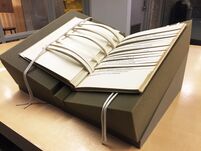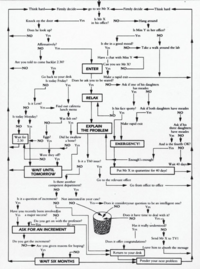User:Kim/reading/Thinking Machines: Difference between revisions
No edit summary |
No edit summary |
||
| (25 intermediate revisions by the same user not shown) | |||
| Line 4: | Line 4: | ||
edt. Hannah B. Higgins and Douglas Kahn | edt. Hannah B. Higgins and Douglas Kahn | ||
<blockquote> | |||
Perec rooted in belief of '''writing''' and creativity as work, the product of '''labour and machinery''' | |||
</blockquote> | |||
Raymond Queneau described Oulipians as | |||
<blockquote> | |||
rats who construct the labyrinth from which they plan to escape. | |||
</blockquote> | |||
<div style="width: 60%; float: right;"> | |||
== P.A.L.F. == | == P.A.L.F. == | ||
: "production automatique de littérature française" | : "production automatique de littérature française" | ||
| Line 13: | Line 22: | ||
::: exhausting the lexicon – everything has the same meaning | ::: exhausting the lexicon – everything has the same meaning | ||
:: in practice: didn't calculate ambiguity, more than one meaning of words in dictionary - decisions had to be made | :: in practice: didn't calculate ambiguity, more than one meaning of words in dictionary - decisions had to be made | ||
</div> | |||
== | <div style="width: 60%; float: left;"> | ||
==[https://en.wikipedia.org/wiki/Oulipo Oulipo]== | |||
: "Workshop for potential literature" | : "Workshop for potential literature" | ||
: '''constraint''' | : '''constraint''' | ||
:: operation that can be made fully explicit, brings forth new text | :: operation that can be made fully explicit, brings forth new text | ||
: | : looking into algorithm / machine as author (Kafka Machine) | ||
</div> | |||
[[File:Queneau cent milliards de poems.jpg |thumb|left|201x201px|Raymond Queneau ''Cent mille milliards de poèmes'' (Paris: Éditions Gallimard [NRF], 1961).]] | |||
<div style="width: 60%; float: right;"> | |||
== [https://www.youtube.com/watch?v=pu6TACgAdTI Die Maschine] == | |||
: commissioned by Saarländischer Rundfunk (SR), Eugen Helmle | |||
: Perec went through different ideas like letting imaginary computer answer question "What is Poetry?" | |||
: final piece was a deconstruction of Goethe's Wanderers Nachtlied | |||
<blockquote> | |||
shift the poem about, replacing vowels, replacing nouns, truncating, foreshortening, changing tenses, persons, rearranging the letters into anagrams, "translating" it by the method known as S+7 | |||
</blockquote> | |||
: "Die Maschine" is not computer art: here operating '''computer is imaginary''' (bringing the idea of computing into literature) | |||
</div> | |||
<div style="width: 60%; float: left;"> | |||
== The Art of Asking your Boss for a Raise == | |||
: presents procedure for obtaining a raise inside organization in form of flowchart of a recursive and incremental algorithm | |||
:: forming single sentence | |||
:: resentment, anger (no change in tone but in level of frustration) | |||
: writing the "simultaneous" flowchart protocol Perec discovered | |||
<blockquote> | |||
time reinserts itself by necessity in any narrative | |||
</blockquote> | |||
: like "Die Maschine", also presented in SR Radio | |||
:: each of the operators in the algorithm has separate voice | |||
</div> | |||
[[File:Perec raise flowchart.png|thumb|right|Flowchart of Georges Perec's radio play 'The Art of Asking your Boss for a Raise'|269x269px]] | |||
<div style="width: 60%; float: right;"> | |||
== Clinamen == | |||
: for Oulipo important '''intentional irregularity''' | |||
:: not permitted by all Oulipo constraints | |||
: Clinamen softens harshness of tex written (or organized) under constraints | |||
:: intentional bending of self imposed rules | |||
::: demonstrating power of author over outcome (?) | |||
</div> | |||
<br> | |||
<div style="width: 100%; display: block;"> | |||
also mentioned: | |||
: [https://en.wikipedia.org/wiki/Life:_A_User%27s_Manual Life A User's Manual] by Georges Perec | |||
: Novel, 1978 (translated into english by David Bellos) | |||
</div> | |||
Latest revision as of 16:28, 20 October 2024
Georges Perec's Thinking Machines
David Bellos
in Mainframe Experimentalism: Early computing and the foundations of the digital arts
edt. Hannah B. Higgins and Douglas Kahn
Perec rooted in belief of writing and creativity as work, the product of labour and machinery
Raymond Queneau described Oulipians as
rats who construct the labyrinth from which they plan to escape.
P.A.L.F.
- "production automatique de littérature française"
- "translation device for automatic production of literature"
- each noun of a sentence would be replaced with its dictionary definition
- Perec and Bénabou: what if you feed these translations into the machines, over and over?
- exhausting the lexicon – everything has the same meaning
- in practice: didn't calculate ambiguity, more than one meaning of words in dictionary - decisions had to be made
Oulipo
- "Workshop for potential literature"
- constraint
- operation that can be made fully explicit, brings forth new text
- looking into algorithm / machine as author (Kafka Machine)
Die Maschine
- commissioned by Saarländischer Rundfunk (SR), Eugen Helmle
- Perec went through different ideas like letting imaginary computer answer question "What is Poetry?"
- final piece was a deconstruction of Goethe's Wanderers Nachtlied
shift the poem about, replacing vowels, replacing nouns, truncating, foreshortening, changing tenses, persons, rearranging the letters into anagrams, "translating" it by the method known as S+7
- "Die Maschine" is not computer art: here operating computer is imaginary (bringing the idea of computing into literature)
The Art of Asking your Boss for a Raise
- presents procedure for obtaining a raise inside organization in form of flowchart of a recursive and incremental algorithm
- forming single sentence
- resentment, anger (no change in tone but in level of frustration)
- writing the "simultaneous" flowchart protocol Perec discovered
time reinserts itself by necessity in any narrative
- like "Die Maschine", also presented in SR Radio
- each of the operators in the algorithm has separate voice
Clinamen
- for Oulipo important intentional irregularity
- not permitted by all Oulipo constraints
- Clinamen softens harshness of tex written (or organized) under constraints
- intentional bending of self imposed rules
- demonstrating power of author over outcome (?)
- intentional bending of self imposed rules
also mentioned:
- Life A User's Manual by Georges Perec
- Novel, 1978 (translated into english by David Bellos)


